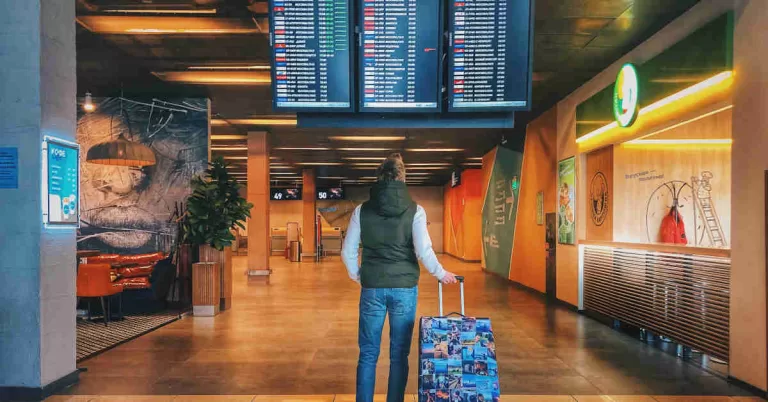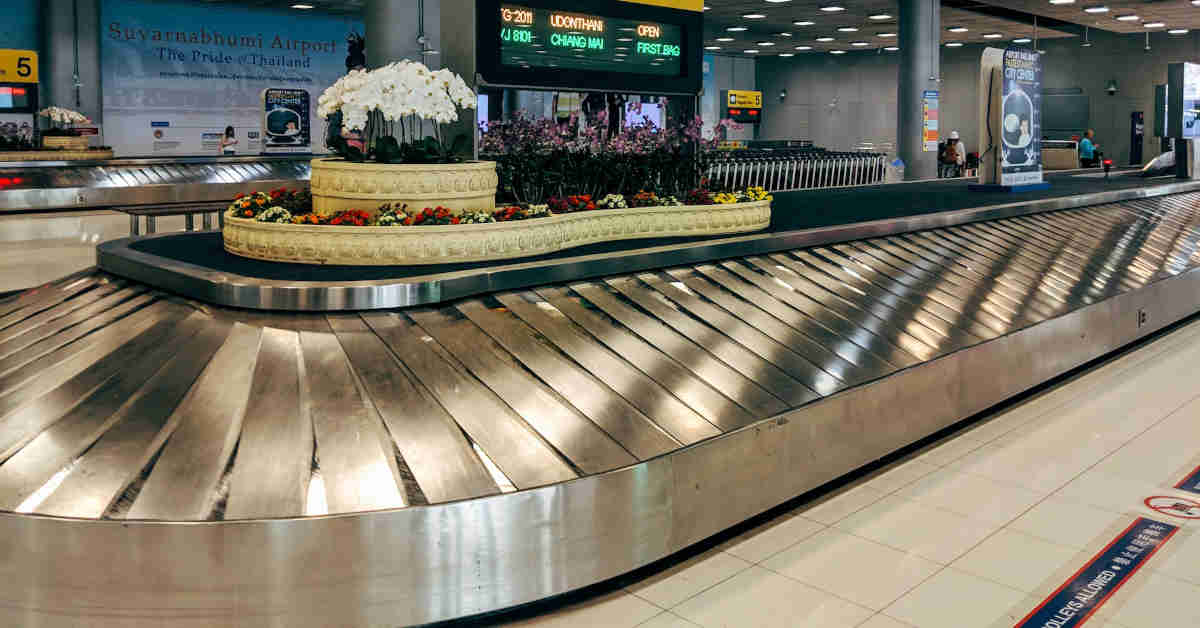Have you ever flown on an itinerary which includes more than one airline, and not had to collect your checked luggage at your connection? Chances are your route was enabled by a codeshare agreement.
This post will explain the basics of codeshare agreements and its effect on checked baggage. We will also provide some practical tips when traveling on codeshare flights.
What is a Codeshare Agreement?
Codeshare agreements are partnerships between airlines in which they share flight numbers for flights run by one of the airlines (operating carrier) but marketed under the airline designator code of the other airline (marketing carrier). Airlines can then expand their route networks and offer you more destinations, while sharing the costs (and profits!) between the airlines taking part in the agreement.
What is an airline designator code?
An airline designator code, also known as an air carrier code, is a unique code assigned by the International Air Transport Association (IATA) to identify a particular airline. The code is typically two or three letters long, and is used by reservation systems, flight schedules, and other infrastructure to identify the airline. For example, the code for American Airlines is “AA” and the code for Delta Air Lines is “DL”.
For example, if American Airlines and British Airways have a codeshare agreement for a flight from New York to London, you can book the flight under either American Airlines or British Airways. If you book the flight under American Airlines, you will receive an American Airlines flight number and boarding pass, but the flight will be operated by British Airways.
Similarly, if you book the flight under British Airways, you will receive a British Airways flight number and boarding pass, but the flight will be operated by American Airlines.
Why Airlines Have Codeshare Agreements
Airlines have codeshare agreements for a variety of reasons, but primarily to increase their reach, convenience, and profitability.
Increased Reach
One of the main reasons why airlines enter into codeshare agreements is to expand their reach. By partnering with another airline, an airline can offer you flights to destinations it doesn’t service directly. Airlines will then be able to offer a more comprehensive network of destinations, making it easier for you to find flights to your desired destinations.
For example, if you want to fly from New York to Mumbai, but the airline you prefer doesn’t operate direct flights to Mumbai, you can still book a ticket on that airline by connecting to a codeshare partner’s flight to Mumbai.
Improved Convenience
Codeshare agreements also provide you with more convenient scheduling options. Airlines can offer you more frequent flights to a particular destination by partnering with another airline that runs flights to that destination. You will have more options to choose from, allowing you to find a flight that fits their schedule.
Additionally, codeshare agreements can simplify the booking process by allowing you to book a single ticket for a trip that involves multiple flights on different airlines.
Increased Profitability
Codeshare agreements can also be a lucrative arrangement for airlines. By partnering with another airline, airlines can increase the number of travelers they serve, leading to increased revenue. Airlines can also reduce costs by sharing resources, such as aircraft, personnel, and maintenance facilities. Additionally, airlines can increase their profits by selling tickets for flights operated by their codeshare partners, thereby earning a commission on those sales.
Increased Competition
Codeshare agreements can also help airlines increase competition in the industry. By partnering with another airline, an airline can offer you flights to destinations that are already served by other airlines. The airline to compete more effectively with other airlines, providing you with more choices and (hopefully) lower prices.
Increased Brand Awareness
Codeshare agreements can help airlines increase brand awareness. By partnering with another airline, an airline can expand its reach into new markets and reach new customers. This can help the airline build its brand and establish a stronger presence in the industry.
Advantages of Codeshare Agreements to Passengers
Codeshare agreements offer several benefits for passengers, including:
Simplified Check-In Process
One of the biggest advantages of codeshare agreements is the simplified check-in process. When you book a flight that is a part of a codeshare agreement, you will typically check-in with the airline that you originally booked with. You don’t have to worry about checking in with multiple airlines, as all of your flight information will be available through a single check-in process. This can save you time and make your travel experience much more convenient.
Baggage Tracking
Another advantage of codeshare agreements is the improved baggage tracking process. When you book a flight that is part of a codeshare agreement, your checked baggage will typically be tracked by the airline that you originally booked with. So, you will have access to information about your checked baggage throughout your entire journey, and you won’t have to worry about losing track of your luggage along the way.
Improved Flight Connections
Codeshare agreements also make connecting flights much easier for passengers. When you book a flight that is part of a codeshare agreement, your connecting flights will typically be coordinated by the airline that you originally booked with. You won’t have to worry about missing a connecting flight or having to deal with the hassle of transferring your checked baggage between airlines.
Access to More Destinations
Codeshare agreements give you access to a wider range of destinations. When two airlines enter into a codeshare agreement, they will typically offer flights to each other’s destinations. You will have access to a much wider range of destinations, making it easier for you to find the flight that meets your needs.
Disadvantages of Codeshare Agreements to Passengers
Sorry folks, it’s not all good news about codeshare agreements. Here are some issues with codeshare agreements that you need to be aware of.
Lack of Interline Baggage Agreement
One of the main disadvantages of codeshare agreements is that not all airlines have interline baggage agreements. If you are traveling on a codeshare flight and have a connecting flight with another airline, you may have to collect your checked baggage after your first flight and then recheck it with the second airline. Rechecking bags can be a time-consuming and stressful process, particularly if you have a tight connection time. Additionally, there is a risk of the checked baggage not making it to the final destination, which can be very inconvenient and stressful.
Baggage Fees and Allowance Restrictions
Another disadvantage of codeshare agreements is that baggage fees and allowance restrictions can vary between airlines. For example, if you are traveling on a codeshare flight operated by one airline but marketed by another, the baggage fees and allowance restrictions of the marketing airline may not apply. This can lead to confusion and unexpected costs if you are not aware of the baggage restrictions of the operating airline. Furthermore, you may not be able to use frequent flyer benefits, such as free checked baggage, when traveling on a codeshare flight.
Limited Flight Information
Another issue with codeshare agreements is that you may not receive correct flight information. For example, you may book a codeshare flight on an airline’s website and be unaware that the flight is actually operated by another airline. This can result in confusion about the flight itinerary, baggage restrictions, and in-flight amenities. Additionally, if there are flight delays or cancellations, it may be unclear as to who to contact for assistance or compensation.
I consider myself an experienced traveler – however this particular issue caused some confusion on a flight I took from Melbourne to Kuala Lumpur in early 2022. My flight was with Malaysia Airlines (the operating carrier). I had arrived at the airport and was earnestly looking at the departure board to confirm that my flight was on schedule. I had a moment of panic as I could not see my flight number displayed on the board. My flight number did eventually appear for a brief moment – my flight had four, yes FOUR, additional codeshare partners. The display board was cycling through the flight numbers of each airline.
Lack of Coordination
Codeshare agreements also often lack coordination between airlines, which can result in inconsistencies and difficulties for passengers.
For example, you may be expecting a certain level of service or in-flight amenities on a codeshare flight, only to find that the operating airline has a different policy. This can be particularly problematic if you have special needs, such as traveling with infants or those with disabilities.
Limited Options for Frequent Flyer Programs and Seat Selection
You may not be able to earn frequent flyer miles or select seats on the operating airline’s website or app, as codeshare flights are often not recognized by these systems. With regards to seat selection, this service can become available when you are able to check-in online. However, sometimes you may not be able to select a seat until you arrive at the airport to check-in.
Tips for Dealing with Codeshare Agreements
Here are some tips to help you navigate the complexities of checked baggage in codeshare agreements:
Know Your Airlines
When booking a flight, it’s important to know which airline is operating the flight and which airline is selling the tickets. This information can usually be found on your itinerary or by contacting the airline directly. Understanding which airline you are flying with can help you better understand the baggage policies and what to expect.
Review Baggage Policies
Before your trip, make sure to review the baggage policies of both the operating and selling airlines. This information can be found on their websites. It’s important to note that the operating airline’s baggage policy will generally apply, but there may be exceptions, so it’s always best to double-check.
Pay Attention to Baggage Fees
It’s common for airlines to charge fees for checked baggage, and these fees can vary between airlines. Make sure to review the baggage fees for both the operating and selling airlines to avoid any surprises at the airport. If you’re unsure about the fees, it’s best to contact the airline directly for clarification.
Label Your Baggage
Before checking your baggage, make sure to label it with your name and phone number. This will help ensure that your baggage is returned to you if it becomes lost or delayed during your travels.
Be Prepared for Delayed or Lost Baggage
While it’s rare, delayed or lost baggage can occur. The odds of this happening increases when flying on an itinerary with connecting flights, especially when different airlines are involved.
If your bags are delayed, it’s important to contact the airline as soon as possible to report the issue and to start the process of getting the baggage returned to you. In the event of lost or delayed baggage, the operating airline will generally be responsible for locating and returning your belongings.
Consider Travel Insurance
Finally, consider buying travel insurance to provide additional coverage for lost, delayed, or damaged baggage. Travel insurance can also provide coverage for other travel-related issues, such as trip cancellation, medical expenses, and more.
It’s worthwhile to check the benefits of any credit cards that you hold. Some cards offer free luggage insurance.
Final Thoughts
Codeshare agreements can be a convenient way to travel, but they can also create confusion when it comes to checked baggage.
Unfortunately, codeshare agreements aren’t created equally. It’s because of this inconsistency that confusion arises. It’s also not uncommon when contacting an airline about a codeshare agreement that you’ll receive conflicting advice.
Another issue that can arise is when there is an issue with your checked baggage. You can often end up playing ping pong between the involved airlines, each deflecting responsibility to the other.
Why do I get the sense that codeshare agreements were created primarily for the airlines’ benefit? The fact that us travelers reap some rewards in the process is an unintended consequence (I’m getting cynical in my old age).
Where practical, I avoid traveling on itineraries that involve a codeshare agreement and try to fly with the one airline. Of course, this isn’t always possible.
I feel more confident talking to an airline representative rather than relying on an airline’s codeshare agreement information on their website. During the call, requesting a copy of the advice be sent to your email can help if there are any issues when you check-in.



